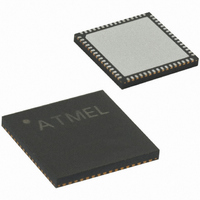ATXMEGA256A3B-MH Atmel, ATXMEGA256A3B-MH Datasheet - Page 214

ATXMEGA256A3B-MH
Manufacturer Part Number
ATXMEGA256A3B-MH
Description
MCU AVR 256KB FLASH A3B 64-QFN
Manufacturer
Atmel
Series
AVR® XMEGAr
Specifications of ATXMEGA256A3B-MH
Core Processor
AVR
Core Size
8/16-Bit
Speed
32MHz
Connectivity
I²C, SPI, UART/USART
Peripherals
Brown-out Detect/Reset, DMA, POR, PWM, WDT
Number Of I /o
49
Program Memory Size
256KB (128K x 16)
Program Memory Type
FLASH
Eeprom Size
4K x 8
Ram Size
16K x 8
Voltage - Supply (vcc/vdd)
1.6 V ~ 3.6 V
Data Converters
A/D 16x12b; D/A 2x12b
Oscillator Type
Internal
Operating Temperature
-40°C ~ 85°C
Package / Case
64-MLF®, 64-QFN
Processor Series
ATXMEGA256x
Core
AVR8
Data Bus Width
8 bit, 16 bit
Data Ram Size
16 KB
Interface Type
I2C, SPI, USART
Maximum Clock Frequency
32 MHz
Number Of Programmable I/os
49
Number Of Timers
7
Operating Supply Voltage
1.6 V to 3.6 V
Maximum Operating Temperature
+ 85 C
Mounting Style
SMD/SMT
3rd Party Development Tools
EWAVR, EWAVR-BL
Development Tools By Supplier
ATAVRDRAGON, ATAVRISP2, ATAVRONEKIT
Minimum Operating Temperature
- 40 C
On-chip Adc
12 bit, 8 Channel
On-chip Dac
12 bit, 2 Channel
For Use With
ATAVRONEKIT - KIT AVR/AVR32 DEBUGGER/PROGRMMRATSTK600 - DEV KIT FOR AVR/AVR32770-1007 - ISP 4PORT ATMEL AVR MCU SPI/JTAG770-1004 - ISP 4PORT FOR ATMEL AVR MCU SPI
Lead Free Status / RoHS Status
Lead free / RoHS Compliant
Other names
ATXMEGA256A3B-MU
ATXMEGA256A3B-MU
ATXMEGA256A3B-MU
Available stocks
Company
Part Number
Manufacturer
Quantity
Price
Part Number:
ATXMEGA256A3B-MH
Manufacturer:
ATMEL/爱特梅尔
Quantity:
20 000
- Current page: 214 of 445
- Download datasheet (6Mb)
19.5.1
19.5.1.1
19.5.1.2
19.5.1.3
19.5.1.4
19.5.2
19.5.3
8077H–AVR–12/09
Transmitting Address Packets
Transmitting Data Packets
Receiving Data Packets
Case M1: Arbitration lost or bus error during address packet
Case M2: Address packet transmit complete - Address not acknowledged by slave
Case M3: Address packet transmit complete - Direction bit cleared
Case M4: Address packet transmit complete - Direction bit set
After issuing a START condition, the master starts performing a bus transaction when the mas-
ter Address register is written with the slave address and direction bit. If the bus is busy the TWI
master will wait until the bus becomes idle. When the bus is idle the master will issue a START
condition on the bus before the address byte is transmitted.
Depending on arbitration and the R/W direction bit one of four distinct cases (1 to 4) arises fol-
lowing the address packet. The different cases must be handled in software.
If arbitration is lost during the sending of the address packet the master Write Interrupt Flag and
Arbitration Lost flag are both set. Serial data output to the SDA line is disabled and the SCL line
is released. The master is no longer allowed to perform any operation on the bus until the bus
state has changed back to idle.
A bus error will behave in the same way as an arbitration lost condition, but the Error flag is set
in addition to Write Interrupt Flag and Arbitration Lost flag.
If no slave device responds to the address the master Write Interrupt Flag is set and the master
Received Acknowledge flag is set. The clock hold is active at this point preventing further activity
on the bus.
If the master receives an ACK from the slave, the master Write Interrupt Flag is set, and the
master Received Acknowledge flag is cleared. The clock hold is active at this point preventing
further activity on the bus.
If the master receives an ACK from the slave, the master proceeds receiving the next byte of
data from the slave. When the first data byte is received the master Read Interrupt Flag is set
and the master Received Acknowledge flag is cleared. The clock hold is active at this point pre-
venting further activity on the bus.
Assuming case 3 above, the master can start transmitting data by writing to the master Data reg-
ister. If the transfer was successful the slave will signal with ACK. The master Write Interrupt
Flag is set, the master Received Acknowledge flag is cleared and the master can prepare new
data to send. During data transfer the master is continuously monitoring the bus for collisions.
The Received Acknowledge flag must be checked for each data packet transmitted before the
next data packet can be transferred. The master is not allowed to continue transmitting data if
the slave signals a NACK.
If a collision is detected and the master looses arbitration during transfer, the Arbitration Lost
flag is set.
Assuming case 4 above the master has already received one byte from the slave. The master
Read Interrupt Flag is set, and the master must prepare to receive new data. The master must
respond to each byte with ACK or NACK. Indicating a NACK might not be successfully executed
XMEGA A
214
Related parts for ATXMEGA256A3B-MH
Image
Part Number
Description
Manufacturer
Datasheet
Request
R

Part Number:
Description:
DEV KIT FOR AVR/AVR32
Manufacturer:
Atmel
Datasheet:

Part Number:
Description:
INTERVAL AND WIPE/WASH WIPER CONTROL IC WITH DELAY
Manufacturer:
ATMEL Corporation
Datasheet:

Part Number:
Description:
Low-Voltage Voice-Switched IC for Hands-Free Operation
Manufacturer:
ATMEL Corporation
Datasheet:

Part Number:
Description:
MONOLITHIC INTEGRATED FEATUREPHONE CIRCUIT
Manufacturer:
ATMEL Corporation
Datasheet:

Part Number:
Description:
AM-FM Receiver IC U4255BM-M
Manufacturer:
ATMEL Corporation
Datasheet:

Part Number:
Description:
Monolithic Integrated Feature Phone Circuit
Manufacturer:
ATMEL Corporation
Datasheet:

Part Number:
Description:
Multistandard Video-IF and Quasi Parallel Sound Processing
Manufacturer:
ATMEL Corporation
Datasheet:

Part Number:
Description:
High-performance EE PLD
Manufacturer:
ATMEL Corporation
Datasheet:

Part Number:
Description:
8-bit Flash Microcontroller
Manufacturer:
ATMEL Corporation
Datasheet:

Part Number:
Description:
2-Wire Serial EEPROM
Manufacturer:
ATMEL Corporation
Datasheet:











